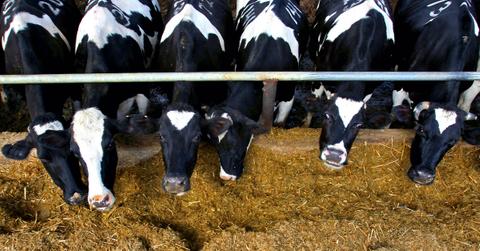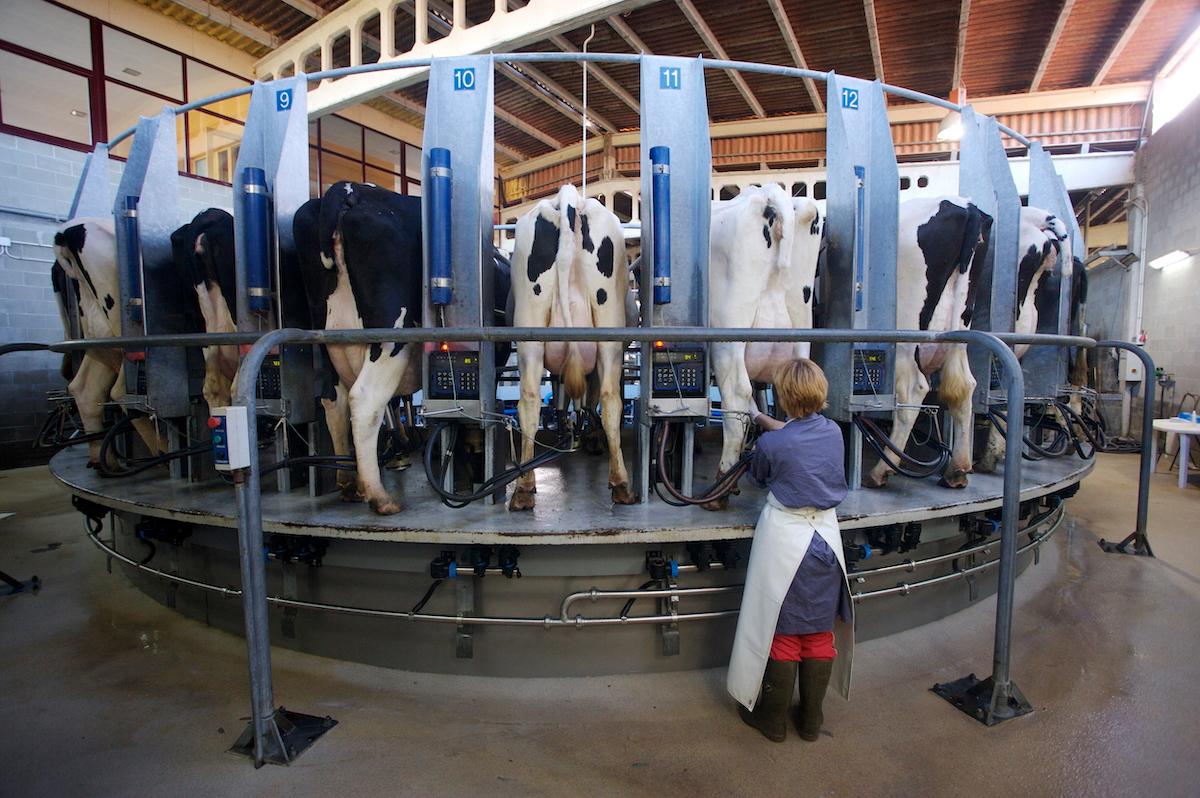If the Dairy Industry Was a Country, It Would Be One of the World's Biggest Emitters, Report Finds
Big dairy is responsible for as many greenhouse gas emissions as the entire U.K., according to a new report.
Updated June 16 2020, 2:29 p.m. ET

Animal agriculture is one of the leading causes of the climate crisis — and that's in large part thanks (but no thanks) to the polluting dairy industry. According to a new report, the world’s 13 largest dairy corporations emit the same amount of greenhouse gases as the entire U.K., as per The Guardian.
Basically, if the dairy industry were a country, it would be one of the biggest GHG emitters in the world.
Shefali Sharma, the Director of Institute for Agriculture and Trade Policy (IATP) Europe, published the report Milking the Planet: How Big Dairy is heating up the planet and hollowing rural communities on Monday, June 15.
As Sharma explains in her report, the combined emissions of the world’s 13 biggest dairy corporations in 2017 are higher than two major fossil fuel companies: Australia-based mining, oil, and gas giant BHP, and U.S.-based multinational oil company ConocoPhillips.

“Unlike growing public scrutiny on fossil fuel companies, little public pressure exists to hold global meat and dairy corporations accountable for their emissions, even as scientific evidence mounts that our food system is responsible for up to 37 percent of all global emissions,” Sharma wrote.
Additionally, between 2015 and 2017, the total combined emissions of the 13 corporations increased by 11 percent; in that same time frame, some of the dairy corporations’ emissions increased by as much as 30 percent. And again, as The Guardian summarized based on Sharma’s calculations, these 13 massive dairy corporations are producing the same amount of emissions as the entire country of the U.K.
“Two years after we reported our first estimates, our second study shows that the dairy industry remains unaccountable,” Sharma said in a statement via Forbes, referring to IATP and GRAIN’s 2018 global assessment titled Emissions Impossible: How big meat and dairy are heating up the planet. “This means that governments must regulate powerful corporations that control the milk supply and oblige them to foot the bill for environmental and public health impacts, rather than villainizing farmers trapped in the system.”
Sharma notes that none of these 13 major dairy corporations are legally required by law to share their emissions data or commit to lowering their environmental impacts, even though the countries they are based in are parties to the Paris Agreement. Only three of the 13 have set goals addressing their dairy supply chains, and zero out of the 13 have set goals to significantly reduce the emissions from their dairy supply chains. With no one requiring these companies reduce their emissions, and with the industry continuing to rake in massive profits (in part thanks to the government subsidies presented to dairy farmers), these dairy corporations will continue putting profit ahead of the planet (not to mention, animal welfare and human health).
Vegan climate activist Greta Thunberg shared 'Milking the Planet.'
17-year-old climate leader Greta Thunberg shared The Guardian’s article about the study on Twitter, followed by the hashtags #vegan and #ClimateCrisis. Greta has been vegan for several years, because of the impact of animal agriculture on the planet and the cruelty involved in the industry.
What can we do about the dairy industry's pollution?
Cows produce immense amounts of methane, a potent greenhouse gas, among other GHGs; they require more land, water, and feed than you can imagine; and their waste pollutes the communities surrounding the farms and factory farms where they are raised — most often low-income Black and Brown communities, according to the Food Empowerment Project.
For that reason, going vegan, or at least removing meat and dairy products from one’s diet, is the most effective way to reduce an individual’s environmental impact — in terms of GHG emissions, land use, water use, deforestation, and more, according to a comprehensive 2018 study by the University of Oxford.
There are so many issues in the commercial food system, but eating a plant-based diet can drastically lower one’s footprint on the planet; not to mention, eating vegan is unquestionably better for animals, and a plant-based diet can yield incredible health benefits. Fortunately, replacing the dairy in one’s diet is so much easier than it used to be thanks to the amazing resources and products available. Check out our guides to transitioning to a plant-based diet, some of our favorite vegan cheese brands, and which non-dairy milk is best for the planet.